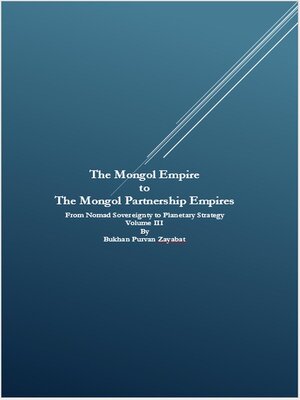The Mongol Empire to the Mongol Partnership Empires
ebook ∣ From Nomad Sovereignty to Planetary Civilization Volume III
By Bukhan Purvan Zayabat

Sign up to save your library
With an OverDrive account, you can save your favorite libraries for at-a-glance information about availability. Find out more about OverDrive accounts.
Find this title in Libby, the library reading app by OverDrive.



Search for a digital library with this title
Title found at these libraries:
| Library Name | Distance |
|---|---|
| Loading... |
The Mongol Empire to the Mongol Partnership Empires: From Nomad Sovereignty to Planetary Civilization — Volume III brings to culmination a sweeping philosophical and strategic reinterpretation of the Mongol legacy as the missing foundation for today's global future.
This volume journeys through the deeper ideas behind Mongol governance—beyond conquest—into the systems of partnership, decentralization, mobility, and trust that defined the empire at its greatest height. From the Ortoq system of transcontinental commerce to the 3.3% indirect tax as an ethical model for planetary-scale governance, the Mongols built a civilization not on domination but on interoperability. This is a world of cooperation without homogenization, of dignity through shared prosperity, and of governance without feudal hierarchy—an idea more urgently needed today than ever.
The book also confronts the civilizational tragedy of the Mongols: the loss of their spiritual sovereignty rooted in Eternal Tengiriism, and the slow sedentarization that hollowed out their mobile genius. It was not merely war that ended the Mongol Partnership Empires, but forgetting—the forgetting of Tengiri, the flattening of fluidity into fixed rule, the surrender of openness to border. This forgetting is not just history—it is our own fate, if unheeded.
Across its chapters, Volume III reopens the "smooth space"—a Deleuzian concept of open, flexible, mobile society—lost under the heavy architecture of fixed borders and nation-states. Through essays that range from the nomadic reinterpretation of free-market economies to the practical lessons in planetary governance and climate migration, this book is both historical retrieval and strategic manifesto. The final chapters look boldly toward the future—inviting a return not to empire, but to partnership; not to centralization, but to nomadic openness.
This is not just a book about the past Mongol Empire. It is a call to recognize that the age of the Mongol mind has yet to begin—and when it does, it will not look like horses riding across Eurasia, but networks of planetary cooperation, open cultures, decentralized economic federations, and a spacefaring humanity with dignity for all.







